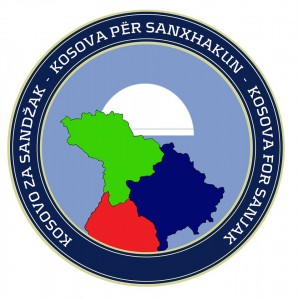Geographical location
The Albanian language (shqip) is spoken by over six million people in the southwestern Balkans, primarily in the Republic of Albania and in the neighbouring countries which once formed part of the Yugoslav federation (Kosova, Macedonia, Montenegro and Serbia).
In Albania itself, the language is spoken by the entire population of 3,087,159 inhabitants (census of April 2001), including some bilingual ethnic minorities. In Kosovo, where there are as yet no reliable population statistics, Albanian is spoken by almost the entire population of about two million individuals, including some bilingual minorities: Bosniaks, Turks, Croats and Roma. Ethnic Serbs in Kosova (now about five percent of the population) have traditionally refused to learn or speak Albanian, but attitudes may change once traditional hostilities and ethnic tensions subside.The Republic of Macedonia is estimated to have at least half a million Albanian speakers, equaling about twenty-five percent of the total population of the republic, although there are no reliable statistics. The Albanian population is to be found in and around Skopje (Alb. Shkup), where it constitutes a substantial minority, Kumanova (Maced. Kumanovo) and, in particular, in western Macedonia from Tetova (Maced. Tetovo), Gostivar and Dibra (Maced. Debar) down to Struga, where it forms the majority.A minority of about 50,000 Albanian speakers is also to be found in Montenegro, mostly along the Albanian border (Ulqin-Ulcinj, Tuz and Gucia/Gusinje). There are also at least 70,000 to 100,000 Albanian speakers scattered throughout southern Serbia, primarily in the Presheva Valley near the borders of Macedonia and Kosova.To the south of Albania, in Greece, there are traditional settlements of Çamërian dialect speakers, in particular around Parga and Igoumenitsa in Epirus. Despite border changes and deportations to Albania, the Albanian population here may be as high as 100,000, although they are highly assimilated. In central Greece, the Albanian language, known in Albanian as Arbërisht and in Greek as Arvanitika, languishes in about 320 villages, primarily those of Boeotia (especially around Levadhia), southern Euboea, Attica, Corinth and northern Andros. These speakers are the descendants of large-scale Albanian emigration to Greece during the late Middle Ages. No official statistics exist as to their numbers. This exceptionally archaic form of Albanian is dying out rapidly.In southern Italy, there is a small but well-established Albanian-speaking minority, the so-called Arbëresh, or Italo-Albanians. These are the descendants of refugees who fled Albania after the death of Scanderbeg in 1468. As a linguistic group, the Arbëresh now consist of about 90,000 speakers, most of whom live in the mountain villages of Cosenza in Calabria and in the vicinity of Palermo in Sicily. The Arbëresh speak an archaic dialect of Albanian, which differs substantially from the Albanian now spoken in the Balkans, to the extent that communication is difficult if Arbëresh speakers are not familiar with standard literary Albanian.Traditional Albanian settlements can be encountered sporadically elsewhere in the Balkans: in Arbanasi, a suburb of Zadar on the Dalmatian coast of Croatia; in some villages in the Sandjak in Serbia and in the Bulgarian-Greek-Turkish border region, notably in the Bulgarian village of Mandrica. A few Albanian speakers are also to be found in the Ukraine, notably in villages in the regions of Melitopol’ and Odessa.Little remains of the once extensive colonies of Albanians scattered throughout the Ottoman Empire. The Albanian minority in Egypt has now dissipated, though Albanian communities still exist in large numbers in Turkey (Istanbul, Bursa and elsewhere) and to an extent in Syria, notably in Damascus.Since the late 1980s in Kosova and since the opening of Albania in 1990-1991, there has been a substantial emigration of Albanian speakers from their traditional areas of settlement to other countries, in particular to Greece and Italy. There are also large numbers of Albanian emigrants to be found in western Europe (esp. Germany, Switzerland, Scandinavia and London) and in North America (New York, Boston, Detroit, Toronto).
Origin and development of Albanian
Albanian is a language of the extensive Indo-European family and is thus related to a certain degree to almost all other languages of Europe. The Indo-European character of the language was first recognized in 1854 by the German linguist Franz Bopp (1791-1867). At the same time, Albanian shows no particularly close historical affinity to any other language or language group within the Indo-European family, i.e. it forms a language group of its own.Despite Albania’s geographical proximity to Greece, linguistic contacts with ancient Greek seem to have been sporadic. Roman trading settlements on the Illyrian coast and Albania’s absorption into the Roman Empire, however, left noticeable traces in the language. Borrowings from Latin, which took place over a period of several centuries, were so massive as to threaten the very structure of the language. Cultural contacts with the Slavs (Bulgarians and Serbs), Turks and Italians have also left substantial strata of vocabulary in Albanian.Not only in its vocabulary, but also in its morphology and syntax, Albanian shows many traits in common with other Balkan languages, due both to extinct substrata languages (Illyrian, Thracian, Dacian) and to centuries of parallel development. Among these traits are: a postpositive definite article; the fusion of the genitive and dative case endings; the formation of the numbers 11-19 by “one on ten”; the absence of a grammatical infinitive; and the formation of the future tense with the verb “to want.”Whether or not Albanian is a direct successor of the language of the ancient Illyrians, as is broadly assumed nowadays, is difficult to determine since very few records of the Illyrian language have been preserved
Robert Elsi
